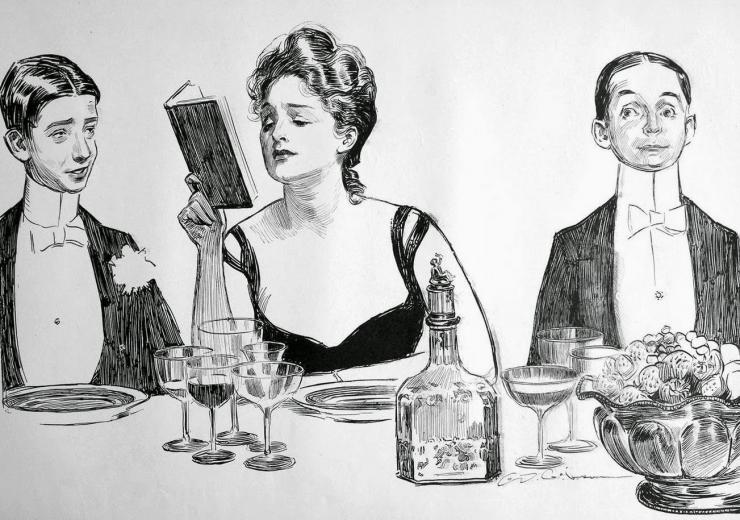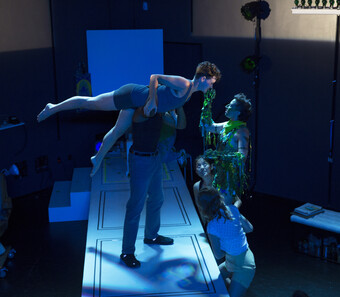Submitting Like A Man
The Plot Thickens
This is the eleventh installment of the blog series Submitting Like A Man (SLAM), created by writer Mya Kagan. The project examines what happens when Mya resubmits scripts to previously rejected opportunities, this time using a man’s name. For more on SLAM, check out submittinglikeaman.com or follow @theSLAMblog or @Mya_Mya.
Today, I’m ready to say something a lot of people have been asking me while simultaneously hoping-and-not-hoping I would say: Based on my experience in SLAM, I think it’s more advantageous to be a man.
That, of course, is my opinion, and it’s based solely on my experience resubmitting my previously-rejected work under a male pseudonym. I consider this project to be not a science experiment, but an art project—a lens through which I am examining the world. This conclusion, that there’s a male advantage, is one I’ve been reluctant to make, having waited to say it until I felt “sure.” And I’m saying it today because what I’m seeing through my lens tells me more and more that people are kinder and more encouraging to men, and more likely to give them the benefit of the doubt. As a “man,” I have seen that my work and I come with an automatic level of authority and prowess, the type of credit that, as a woman, I have to fight to be given.
And so it's after a year of seeing all these nuanced ways in which Max fares better than me that I'm ready to just say, I think there was some bias here.
Until recently, I had only received one differing result to Max’s work, in which Max was named a finalist and sent a kind, encouraging letter, while I’d received a template rejection for the exact same submission a few years prior. Today, I add two similar responses to the list.
The first is an opportunity that has asked Max to advance to the next stage, with the winners still to be determined. When I originally applied, I was not invited to the next stage, which involves submitting some basic additional materials, so seemingly Max’s status is something quite different.
I say “seemingly” because with Max’s successes, it’s my instinct to weigh all the factors in an attempt to assess whether there has been bias or differing treatment. And certainly that scrutiny is a part of administering this project. But at the same time if I, as Mya, applied two years in a row to the same competition, and advanced to the next stage the second year but not the first, I wouldn’t doubt whether I accomplished something or make a What If list (What if the competition opened up its second stage to a larger number of people this year? What if there were different readers? What if zombies ate the brains of this organization’s staff?)—I’d just do a little happy dance, and be excited about making the cut. And so it's after a year of seeing all these nuanced ways in which Max fares better than me that I'm ready to just say, I think there was some bias here.
The other factor in the Bias Column is that the plays for this particular opportunity all have to fit a certain theme, which is the same now as it was when I applied. But the play that Max and I each respectively sent is a play I’ve always thought was a bit of a stretch for the theme. So for Max to still be in the running seems slightly more significant in light of that, because there are all sorts of numbers about how women will only apply to jobs if they're 100 percent qualified, while men will give it a shot even if they’re only 60 percent qualified. But maybe there’s a degree to which a man who meets 60 percent of the criteria is still considered quite qualified, while a woman is not extended that same courtesy unless she meets 100 percent of it. And if that were true, then maybe Max fared better because his submission can speak to a portion of the theme and still remain in the running, while mine cannot.
The other recent differing result that Max got is a rejection letter that was distinct in its niceness. This newest letter was notable because it was even more distinctly encouraging than the other encouraging rejection I mentioned previously.
I have applied to this competition twice as Mya, and both years, I received template rejection letters nearly identical to each other, following the standard three-paragraph form of most rejection letters: (1) Thanks for applying! (2) Sorry, we can’t offer you a spot! (3) It was nifty getting to know your work, so keep in touch, follow us on Twitter, and don’t be mad that we’ve automatically added you to our mailing list!
Max’s letter, however, was different. I pulled up both of my past rejections to compare them to his, and even had a close friend send me the one she got from this organization on the same day Max got his.
Unlike both of my past letters and my friend’s from this year (all three of which were identical save a word or two), Max’s letter was sprinkled with special nuggets of encouragement. Where the usual letter said, “Thank you for submitting your play,” Max’s letter said, “Thank you so much for submitting your play.” Where the usual letter said, “We can’t offer you a spot,” Max’s said, “We can’t offer you a spot because our decisions were really super extra challenging and we had to reject more people than we wanted to.” (“It’s not you, it’s me.”) Where the usual letter said, “Stay in touch,” Max’s said, “Stay closely in touch and be sure to submit again!”
Max also got an additional paragraph letting him know how great he was. The paragraph gushed about all the enthusiasm Max’s play had inspired and let him know earnestly about the passionate dialogue the play created among the readers. He had truly enlightened them and hit on something special with his meaningful work, and it was important to them—really important—to let him know it.
Even if all I’ve been denied was encouraging rejection letters, in this business we can all use all the encouragement we can get. And it seems to me that men get more of it.
What’s further complicated about this situation is that the woman who runs this opportunity and heads the literary department of the organization is an acquaintance of mine. In fact, I know her because she once saw my work and reached out to tell me how much she’d like it. And that’s exactly why I’ve applied to her organization a few times. What’s also interesting is that this organization—a prominent organization that is certainly a household name among theatre artists—is a public supporter of gender parity and diversity in the arts. They’ve even tweeted their support of SLAM on several occasions. And their track record supports their position of encouraging diversity—they’ve had no lack of women and minorities among their writers and artists. So to me this suggests that even those who clearly and measurably support diversity can still be subject to bias.
I’d be lying if I claimed this didn’t hurt, perhaps more than the others. This particular play of mine has always felt like “the one that got away.” It’s had some interest here and there, but it’s never been produced, and I’ve always felt that was a shame; I think it has real substance to it while being funny and uniquely theatrical. I wrote it almost ten years ago so I’ve mostly given up on shopping it around, but I often think back to it fondly, wondering if maybe there was someone out there who would finally see in it what I saw in it. So to finally get some affirmation, after almost a decade, that I wasn’t totally wrong in feeling like I’d written something special was a real heartbreak. Because I only got that affirmation by being a dude. And further to that, this experience lives alongside a lifetime of sexism: being mansplained about how to stand on a subway platform; being disparagingly called “honey” at the hardware store; being passed over for dream jobs when the all-male hiring team went with the guy. It’s yet again being treated differently because of my gender. And even if all I’ve been denied was encouraging rejection letters, those are still encouraging, and in this business we can all use all the encouragement we can get. And it seems to me that men get more of it.
The final notable thing is that between the three different results Max has received, something that stands out to me is that each of these scenarios involved a different play. It’s not this one same play that I’ve yearned to see succeed being treated differently over and over, it’s three different plays from my body of work; it’s not that I have one single script that really shines but has been held back by Big Bad Bias. It shows me that, in fact, a variety of my work is given better consideration when someone thinks it’s been written by a man. It brings me back to a conclusion I’ve made before: It doesn’t necessarily hurt to be a woman, but it does help to be a man.










Comments
The article is just the start of the conversation—we want to know what you think about this subject, too! HowlRound is a space for knowledge-sharing, and we welcome spirited, thoughtful, and on-topic dialogue. Find our full comments policy here
This is not the first time this type of experiment has been conducted. A similar but more expansive test was also done in the US and yielded a similar result. It will take some digging, but I will see if I can find the reference.
Given all the unknowable factors involved, I can see the argument that the result was not gender-biased EXCEPT for the fact that "Max" received such an encouraging rejection. That required the responder to take the time to add the encouraging words to an obvious template. The comments from your reader who finds it difficult to believe that such bias still exists reminds me of the privileged white who believes that there is no longer any discrimination against blacks because we now have a black president. Being a privileged white who knows better, I feel free to make that comment.
No. I know sexism exists. The "nicer" rejection letter simply does not prove anything. How could it?
Have you ever worked in administration? At a theatre? I'd liken it to being a taxi dispatcher. Total chaos.
Based on this example, you're asking people to believe that subconscious, implicit bias is so prevalent that someone sent a nicer rejection to a man. An equally plausible explanation is that the person who sent the letter had finished eating lunch. People are in a better mood at work after eating lunch.
I know this is not a real experiment. But I still find it intellectually dishonest.
But given that Mya did not apply this year, there's no way to know if the nature of the rejection letter changed this year; I've often gotten different letters from year to year depending on who is in charge of sending them.
Also, it's unclear: is the same play being sent by Max that was sent by Mya in each instance?
You are basing your conclusions on pure conjecture. You have no idea who initially reviewed your submissions over the years. Are you seriously suggesting that at a time when demand for female writers is at an all-time high that you received a nicer rejection notice because they thought you were a man? You have no idea of the motives. You don't know who the staff involved were, or if they changed policies, or if they remembered the work and reacted differently. Hell, they could have remembered the work and thought you had transitioned. That is equally as possible as your conjecture.
I'm having a hard time understanding exactly what your process was, so correct me if I'm wrong, but it sounds like you submitted the same work to the same theatre as a man. The results could just as easily be that they were familiar with the script regardless of gender and were kinder in their process. Why assume bias when there are so many variables involved that no real conclusions can be reached? You're stretching greatly and trying to foment controversy.
Thanks for sharing your thoughts. I do agree with you on many of the ideas you’ve raised, and have addressed them at greater length in past posts from the series. For example, I completely agree there is a huge variety of factors at play in any one submission review and it's impossible to know for sure what contributes to the difference in response. If you haven’t, I’d encourage you to read the other 10 posts in this series where that’s been addressed, and where you can see the evolution of my thoughts on that subject.
Where we differ is that it seems you consider the “conclusions” in my post as if they are being presented as precise, measurable, scientific results, while I describe in the post that they are very much not such. For me they are “conclusions” about my feelings of a lived experience. And even if you disagree with my feeling about that lived experience, for me it’s a lived experience that doesn’t exist in a vacuum — its exists alongside a lifetime of experiences in which I’ve been treated differently due to my gender in both measurable and less-measurable ways. My goal in writing this post was to share with others how it felt to live an experience; I am not claiming that my experience is some sort of scientifically definitive result, which is why I disagree with your assertion that I am attempting to “foment controversy.”
As for the possibility you raised that perhaps the second organization I describe was just being kinder in their process — that possibility is unfortunately contradicted by the fact that my friend who applied to the same opportunity got the form letter I’ve received in the past, while my male pseudonym got a nicer letter. They were not sending kinder letters to everyone — it was, for whatever reason, different treatment.
I will look at the older pieces, but I have to ask: Do you actually believe that this theatre company is so implicitly sexist that they sent you a different rejection notice based on your gender? A much more logical reason would be that they liked your work *as they stated in the rejection*.
Yes, exactly. They sent a nicer letter because they liked the work. But when I submitted the exact same play under my female name, they did not like it enough to send anything more than a bland form letter. When I resubmitted it under a male name, it received praises. And what's further curious is that the "real," female me seemingly should have the better foot in the door because I have an established professional relationship with the person who administers the competition. My male self is an unknown submitter, yet received a more favorable response. And as we both agree, there are a number of factors that could contribute to the difference in the response he got -- different readers, different applicant pool, and so on. But it could also be the perceived gender of the author. And this isn't an isolated incident. So that's why I feel as stated in the post. Maybe if you'd lived it you wouldn't feel the same way as I do, and that's fine. But given the combination of what I've experienced in life and in the year of this project, I feel it's more likely than not that the differing gender contributed to the differing outcome of the submission.
I'm sorry, I think gender would not be on the list of reasons you received different responses. This would imply a cartoonish level of sexism. For you to interpret it this way...I think it's confirmation bias.
That's fine, you are entitled to feel that way. I don't agree that it would be a cartoonish level of sexism because sexism doesn't have to be blatant to exist, and in this case I don't think there was any overt sexism, I think there was some implicit bias. As another one of my readers put it, there is an "insidious but subtle undervaluing of the female voice," and I think that's what was going on in this case.
If you aren't familiar with the statistics regarding orchestra musicians and bias, you may find it interesting. (This is one of many articles: http://bit.ly/1pqy6OZ ). In short, major orchestras used to have only about 5% female musicians. There was no overt sexism or deliberate attempt to exclude women creating that number, yet things were unfavorable for the women who auditioned. Then the industry switched to a blind audition process, and the number of women quickly rose -- what was once 5% women is now about 30%. It's a great example of an industry that was unintentionally holding women back because of bias, and it's my opinion that if our industry followed suit with blind submissions, we'd see a similar result.